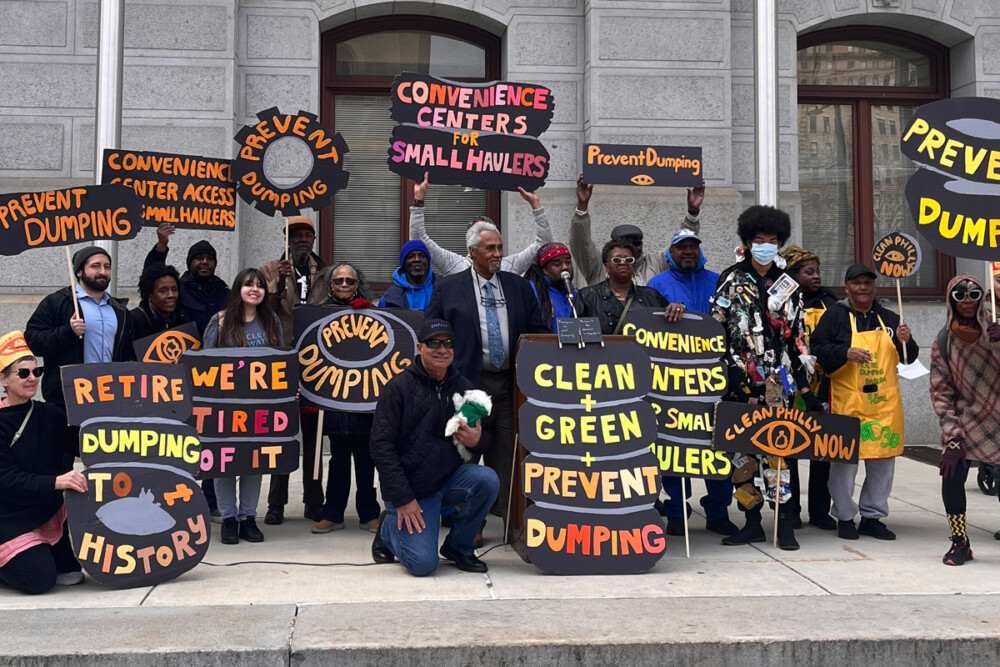
Curbing illegal dumping necessitates a multi-pronged approach. Is recycling part of that equation?
A recent City Council hearing examined the crackdown on illegal dumping. Is the city making progress?
“This short dumping is really out of control.” –Joyce Brooks, Nicetown resident
Illegal dumping – leaving waste in unauthorized areas – is a consistent problem for Philadelphians and has been a focus since the now-defunct Zero Waste and Litter Department. For Philadelphia residents, it is frequently a quality-of-life and environmental justice issue.
“We have rodents and mice because of this illegal dumping,” said Joyce Brooks of Nicetown. “I’ll be 80 years old next year. I want to come out my door and not be afraid that an opossum will jump on me. I’m begging, and I’m pleading.”
Anthony Phillips introduced a resolution to hold a City Council Committee on Streets and Services hearing on March 3rd, calling illegal dumping a contributor to “ecological violence” in Philadelphia’s underserved neighborhoods.
Carlton Williams, Director of the Office of Clean and Green, outlined the office’s commitment to cleaning over its first year as part of the effort to combat illegal dumping. Calling the Office’s inaugural One Philly, United citywide cleanup in the summer of 2024 a “tremendous success,” Williams announced the program would become standard operating procedure twice per year on a 13-week schedule. The first cleanup of 2025 will begin in May.
Additionally, Williams stated that the office of Clean and Green increased their capacity for bulk collections in certain high-density neighborhoods, including twice-weekly trash collections, and adding more Big Belly trash cans focused along commercial corridors, with over 1,500 to be placed outside of Center City.
“Data from our 311 system show illegal dumping complaints have dropped nearly 20 percent across the city this year compared to this time last year. Notably, complaints in [areas]…where twice-a-week collections were introduced in December have dropped by 30 percent,” said Williams. City Council member Rue Landau said that constituents are ‘giving up’ on 311 during a committee hearing on March 19th. Residents have repeatedly found that cases are marked ‘closed’ or ‘unfounded’ despite the reported issues persisting.
When Councilmember Jim Harrity asked if a cost-benefit analysis was conducted on twice weekly collections’ impact on reducing costs related to illegal dumping, the Director replied that the Office is in the beginning stages of data collection and is working with UPenn to conduct a litter study down the line.
Enforcement strategies also expanded in 2024 through the installation of over 300 cameras in known illegal dumping hotspots, combined with steep fines – up to $5,000 per item per incident. Director Williams plans to increase surveillance by more than 100 cameras in 2025 in areas with high rates of 311 complaints.
Panelists asked for more to be done to address the root causes of dumping. Representatives from the Pennsylvania Horticultural Society (PHS) shared the positive effects of cleaning and greening vacant lots. PHS activates vacant lots in partnership with the city through the LandCare program. Care of green spaces leads to a 30% decrease in active dumping, according to studies published by UPenn.
Nic Esposito, former Zero Waste and Litter Director, echoed the call for green space activation in written testimony. He addressed other municipal shortcomings that could be contributing to illegal dumping, such as a lack of regulation for small haulers and limited recycling policies.
Hurdles for Small Haulers
Small haulers have limited options for disposal. Of the 13 convenience centers that accept C&D materials, only four accept small loads, and only two have working phone numbers, according to research conducted by Trash Academy.
Working alongside Circular Philadelphia, Shari Hersh, Founder and Creative Director of Trash Academy – a leading advocacy and research group for the Clean Philadelphia Now Campaign – presented a prevention strategy that focuses on small haulers.
“Philadelphia has the largest amount of construction and demolition materials in our municipal waste stream of any major city in the U.S.,” said Hersh. “Guess what’s in those black bags that you see in our vacant lots and alleys; it’s primarily sheet rock.”
That construction waste frequently ends up in Chester, home of the nation’s largest trash incinerator – making it an environmental justice issue. Almost 38% of children in Chester have asthma, and the city is 72% Black according to recent Census data. Out of the trash that ends up in the incinerator’s dangerous pollution, only 2% comes from Chester itself.
Recycling is not mandated for construction and demolition materials, but doing so could help divert materials away from incinerators, landfills, and illegal dumping grounds.
“If we expand the use of convenience centers, waste can be sorted and diverted into reuse, lessening our impact on the environment and our good friends in Chester,” said Hersh.
Plans for commercial recycling
Recycling rates remain low in Philadelphia. At the business level, commercial recycling policy requires all commercial and residential buildings with two or more non-owner-occupied units to provide a plan for the sorting and removal of recyclable materials. Owners must submit a Commercial Waste Report annually that demonstrates compliance.
Despite regulations, Philadelphians are overall skeptical of actual recycling practices.
Recycling policy for commercial waste – which covers commercial, institutional, and industrial properties, including residential buildings with two or more non owner-occupied units – may change, however. A spokesperson for the Office of Clean and Green Initiatives wrote in an email response, “The Recycling Office is currently reviewing and revamping Commercial Waste planning and reporting processes in collaboration with [the] Department of Commerce and Mayors Office. This will […] likely impact the current regulations.”
Cover photo: Courtesy of Trash Academy






